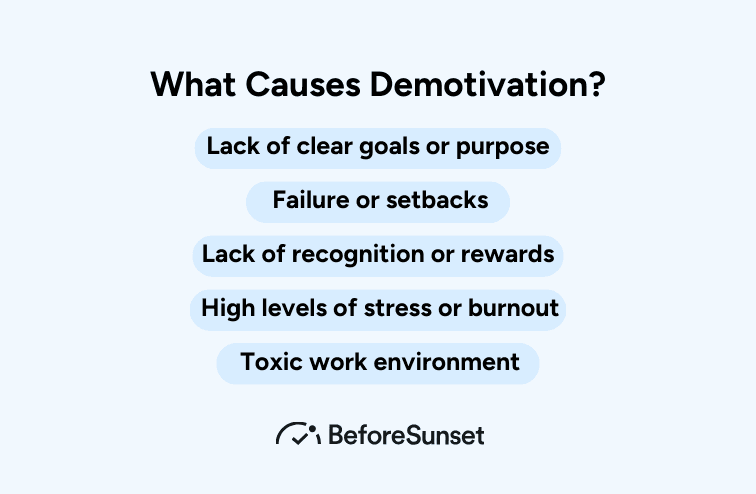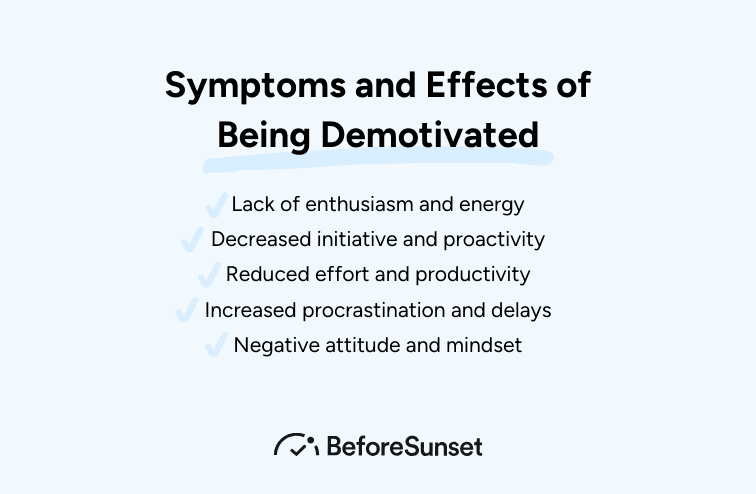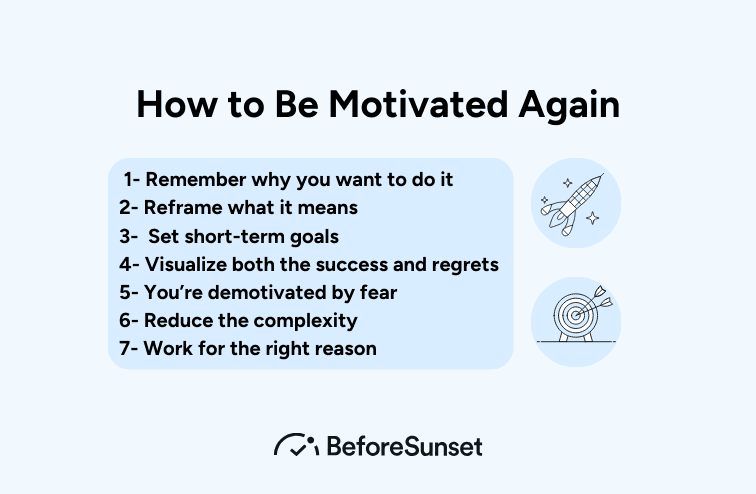Our behaviors, progress toward our objectives, and capacity for achievement are all fueled by motivation. We occasionally, however, struggle with motivation or encounter a demotivating condition. To properly manage demotivation and regain our motivation, it is essential to comprehend its whole description. We will examine the many facets of demotivation in this thorough blog, including its causes, effects, and symptoms. We will look at the negative impacts it may have on both our personal and professional life, as well as the causes of it.
What is Motivation?
The psychological drive or driving force that begins, guides, and maintains action toward the achievement of a goal is referred to as motivation. It is the driving force behind why people act, make decisions, and behave the way they do. Both intrinsic (inside) and extrinsic (within) motivation are possible.
Personal happiness, delight, or an innate interest in a task or activity are the main sources of intrinsic motivation, which comes from inside an individual. It frequently incorporates a feeling of accomplishment, mastery, or a drive for personal development. The act of playing an instrument and honing one's talents, for instance, may bring joy and contentment to someone who is organically driven to do so.
On the other hand, extrinsic motivation stems from outside forces like rewards, recognition, punishment, or the desire to avert unpleasant outcomes. It entails acting in a certain way in order to get a material or social reward, fulfill requirements, or stay out of trouble.
For instance, the prospect of a bonus or promotion may serve as an extrinsic motivator for an employee to finish a job. Individual objectives, cultural norms, social connections, and personal views, values, and needs can all have an impact on motivation. Numerous theories and models, including Herzberg's two-factor theory, Maslow's hierarchy of requirements, and the self-determination theory, among others, have been put out to explain motivation.
You might also like:
Mastering Productivity: A Comprehensive Guide to Getting Things Done
A Guide to Operational Planning: How to Streamline This Process
50+ Productive Things to Do at Home - The Ultimate List For Productivity Ideas
What is Demotivation?
People who are demotivated lack drive, excitement, and interest in their activities or goals. Demotivation is a state of weakened or absent motivation. It happens when people lose the drive and motivation to complete activities, which lowers effort and performance.
Demotivation may result from a number of things, including a lack of direction or meaningful objectives, persistent failures or setbacks, inadequate praise or incentives, dull or uninteresting jobs, and outside demands or stresses. It may have a negative impact on performance, well-being, and productivity. In order to rekindle motivation and engagement, demotivation must be addressed.
This requires recognizing its causes and putting tactics into practice, such as setting meaningful objectives, delivering praise and incentives, fostering a good atmosphere, providing opportunity for the process of growth, and encouraging work-life balance.

What Causes Demotivation?
Demotivation can be caused by a variety of factors, both internal and external, that can undermine an individual's motivation and enthusiasm. Some common causes of demotivation include:
Lack of Clear Goals or Purpose: When individuals do not have clear objectives or a sense of purpose, it can be challenging to stay motivated. Without a clear direction, it becomes difficult to find meaning and drive in tasks or activities.
Failure or Setbacks: Repeated failures or setbacks without visible progress can demotivate individuals. When efforts do not yield desired results or when obstacles seem insurmountable, motivation can decline.
Lack of Recognition or Rewards: Feeling underappreciated or not receiving recognition for one's efforts can dampen motivation. Humans have a natural need for validation and acknowledgement, and the absence of recognition or rewards can lead to demotivation.
Monotonous or Uninteresting Tasks: Engaging in repetitive or mundane tasks that lack variety or challenge can contribute to demotivation. When tasks become boring or do not tap into an individual's interests, sustaining motivation can be difficult.
High Levels of Stress or Burnout: Excessive stress, overwhelming workloads, or burnout can drain motivation. When individuals feel constantly pressured, exhausted, or emotionally depleted, their motivation can suffer.
Lack of Autonomy or Control: Feeling micromanaged or lacking autonomy in decision-making can demotivate individuals. People generally thrive when they have a sense of control and independence over their work or tasks.
Toxic Work Environment: A negative work environment, characterized by conflicts, lack of support, or poor leadership, can erode motivation. When individuals feel undervalued or face constant negativity, their motivation can diminish.
Personal Issues or External Distractions: Personal problems, health issues, or external distractions can divert focus and impact motivation. When individuals are preoccupied with non-work-related concerns, it can be challenging to maintain motivation.
What are the Consequences of Demotivation?
People who are demotivated lack drive, excitement, and interest in their activities or goals. Demotivation is a state of weakened or absent motivation. It happens when people lose the drive and motivation to complete activities, which lowers effort and performance.
Demotivation may result from a number of things, including a lack of direction or meaningful objectives, persistent failures or setbacks, inadequate praise or incentives, dull or uninteresting jobs, and outside demands or stresses. It may have a negative impact on performance, well-being, and productivity.
In order to rekindle motivation and engagement, demotivation must be addressed. This requires recognizing its causes and putting tactics into practice, such as setting meaningful objectives, delivering praise and incentives, fostering a good atmosphere, providing opportunity for the process of growth, and encouraging work-life balance.

Symptoms and Effects of Being Demotivated
When an individual is demotivated, they may exhibit various symptoms and experience several effects that can impact their well-being, behavior, and performance. Here are some common symptoms and effects of being demotivated:
Lack of Enthusiasm and Energy: Demotivated individuals often display a lack of enthusiasm and energy towards their tasks or goals. They may appear disinterested, apathetic, or detached, lacking the usual drive and passion.
Decreased Initiative and Proactivity: Demotivation can lead to a decline in initiative and proactivity. Individuals may become passive, waiting for instructions rather than taking the initiative to seek out opportunities or solve problems.
Reduced Effort and Productivity: Demotivation often results in reduced effort and lower levels of productivity. Individuals may not put in the necessary time, attention, or quality of work, resulting in diminished output and performance.
Increased Procrastination and Delays: When demotivated, individuals are more likely to procrastinate and delay tasks. They may struggle to start or complete assignments, leading to a buildup of unfinished work and missed deadlines.
Negative Attitude and Mindset: Demotivation can contribute to a negative attitude and decrease the positive mindset. Individuals may become pessimistic, cynical, or resentful, which can further hinder their motivation and impact their interactions with others.
Decreased Creativity and Problem-Solving Abilities: Demotivation can inhibit creativity and problem-solving skills. The lack of motivation and engagement restricts individuals' ability to think innovatively or find effective solutions to challenges.
Emotional Distress and Dissatisfaction: Demotivation often leads to emotional distress and dissatisfaction. Individuals may experience feelings of frustration, stress, or dissatisfaction with their work, leading to a decline in overall well-being.
Strained Relationships and Decreased Teamwork: Demotivation can strain relationships and hinder teamwork. It could turn a positive relationship into a toxic relationship. Individuals may withdraw or display negative behaviors, impacting collaboration and cooperation with colleagues.
Impacted Physical Health: Prolonged demotivation can have physical health consequences. Stress, lack of motivation, and reduced engagement can contribute to fatigue, sleep disturbances, and other stress-related ailments.
Stagnation and Lack of Personal Growth: Demotivation can hinder opportunity for growth and development. Individuals may become stagnant in their roles, lacking the motivation to learn new skills or pursue opportunities for advancement.

How to Be Motivated Again
It might be difficult and unpleasant to feel unmotivated. Lack of motivation might impede your success and general contentment in both your personal and professional lives. The good news is that motivation may be developed and fostered rather than being a fixed condition.
You may rekindle your motivation and rediscover a sense of passion and drive by comprehending the underlying causes of your demotivation and putting useful tactics into practice. We'll look at realistic actions and methods in this manual to rekindle your motivation.
We will provide you the skills and insights to rekindle your drive and push you in the direction of success, from defining meaningful objectives to discovering inspiration, conquering challenges, and cultivating a positive mentality. Let's start this path of regaining your motivation and enjoying a life that is more purpose-driven and satisfying.
Step 1: Remember Why you Want to Do It
Remembering your initial motivation for undertaking the activity or pursuing the goal will help you regain your motivation. Your motivation and excitement may be rekindled when you get in touch with your fundamental causes and motives. Think for a moment on the motivation behind your behavior.
What are the enduring advantages? How well does it fit with your goals and values? You may reignite your enthusiasm and find fresh energy to carry forward by concentrating on the wider picture and the beneficial results you desire. Also, keep in mind how reaching your objective will lead to personal development, fulfillment, or a sense of success.
You may overcome brief setbacks and maintain motivation throughout your trip by maintaining these motives in the forefront of your thoughts.
Step 2: Reframe What it Means
Reframing what it means might help you change your viewpoint on a job or goal and boost your motivation. Demotivation frequently results from the perception of a task as being onerous, tiresome, or overpowering. However, by altering our perspective and how we see the circumstance, we might find fresh inspiration.
Consider the assignment as a chance for development and learning as one method to reframe the situation. Instead of concentrating exclusively on the work necessary, take into account how it might aid in your growth as a person or the learning of new skills.
Accept the difficulties as opportunity to learn more, develop your skills, or pick up priceless experience. Focusing on the task's importance or beneficial effects is another reframing strategy. Think about if it is consistent with your principles, advances a larger cause, or improves the lives of others. You can discover new motivation and a feeling of purpose by turning your attention away from the present obstacles and toward the worthwhile end.
Reframing might also entail segmenting the work into more digestible chunks. Don't let the total objective overwhelm you; instead, concentrate on the specific steps or milestones that will help you reach it. Celebrate each little victory you achieve along the way because it will make you feel like you are making progress and will keep you motivated.
Step 3: Set Short-Term Goals
A good way to reestablish motivation and keep up a sense of progress and achievement is to set short-term objectives. Focusing just on the outcome can be stressful and demotivating when attempting a significant or long-term objective. However, you may clearly define a road to achievement by breaking it down into smaller, more attainable stages.
Short-term goals provide you a feeling of direction and clarity so you can focus on concrete, doable goals. They assist you in creating a plan of action that will bring you closer to your final objective. You get momentum and a sense of achievement by completing these tiny goals along the road, which increases motivation.
It's crucial to make your short-term objectives SMART (specific, measurable, achievable, relevant, and time-bound). This guarantees that your objectives are specific and practical. It also helps to rank these objectives according to their importance and bearing on your main aim. Review and keep tabs on your development toward achieving these quick objectives.
Celebrate every success, no matter how minor, since it will boost your drive and give you a sense of fulfillment. Depending on how you're doing and how things are changing, you may need to change your goals or action plans.
Step 4: Visualize Both the Success and Regrets
By seeing both the beneficial effects and potential regrets linked with your activities, visualization is an effective tool that may help you rediscover motivation. You may engage your emotions and forge a powerful mental picture of the possible outcomes by vividly envisioning your successes and regrets.
This will inspire and motivate you to take action. Visualize success at first. Close your eyes and visualize reaching your objective or finishing the current work. Imagine yourself feeling the happiness, fulfillment, and sense of achievement that success brings. Imagine the enhancements it makes to your life, the doors it opens, and the satisfaction it offers.
Use all of your senses to fully immerse yourself in this image and experience the feelings that go along with your achievement. Next, consider possible regrets. Think about not acting or giving up on your objective. Imagine the disappointment, remorse, and potential missed opportunities that may occur.
Consider the detrimental effects it may have on your life, relationships, or personal development. Allow these feelings to come to you and use them as motivation to prevent future regrets.
Step 5: You’re Demotivated by Fear
It might seem like an impossible obstacle to conquer when fear acts as a demotivating factor. Fear has a way of paralyzing us, making it difficult for us to act or achieve our objectives. But it's important to understand that fear is a normal reaction that can be dealt with. We may start to change our perspective and take action toward restoring motivation by recognizing and comprehending the specific anxieties that are preventing us from moving forward.
To overcome fear and rekindle our desire, we may break down our fears into smaller, more manageable stages, seek support from dependable people, challenge limiting beliefs, and visualize positive results. In order to successfully overcome fear, we must be persistent and practice self-compassion throughout this process.
By facing our anxieties head-on, we may release ourselves from their hold, rediscover our drive, and create new pathways for our own personal development and success.
Step 6: Reduce the Complexity
Fear can be demotivating, causing us to feel stuck and unable to take action. However, it's important to remember that fear is a natural response and can be addressed. To regain motivation, we can start by identifying and understanding our specific fears.
Breaking fear down into smaller steps, seeking support, challenging negative beliefs, and visualizing success can all help us overcome fear and find our motivation again. Being patient with ourselves and practicing self-compassion throughout the process is essential. By confronting our fears head-on, we can break free, regain motivation, and experience personal growth.
Step 7: Work for The Right Reason
Finding contentment and maintaining motivation in our professional endeavors depends on why we work. Our efforts become more meaningful and fulfilling when we operate with a feeling of purpose and congruence. To make sure that our job reflects who we truly are, it's critical to focus on our beliefs, interests, and long-term goals.
We engage intrinsic motivation by working on projects that actually thrill us, provide us the chance to make a difference, or help something bigger than ourselves. Working for the right reasons emphasizes one's own personal fulfillment, development, and feeling of purpose above and beyond material gains. When we are able to connect with the underlying purpose of our job, we are better able to overcome obstacles, maintain our careers and career development.

How to Avoid Becoming Demotivated in the Future
To avoid becoming a demotivated employee in the future, it's important to proactively cultivate a positive mindset and adopt effective strategies. Here are some actionable tips to help you maintain motivation:
Set clear and Meaningful Goals: Establish specific, achievable, and meaningful goals that align with your values and aspirations. Break them down into smaller milestones and track your progress to stay motivated.
Find Purpose and Meaning: Connect your work to a larger purpose or mission that resonates with you. Understand how your efforts contribute to something meaningful, whether it's personal growth, making a positive impact, or fulfilling a passion.
Celebrate Successes: Acknowledge and celebrate your achievements, no matter how small. Recognizing your progress boosts confidence and keeps motivation high. Take time to reflect on your accomplishments and reward yourself for your hard work.
Seek Inspiration: Surround yourself with inspiring people, stories, and resources. Engage in activities that fuel your passion and creativity. Read books, listen to podcasts, or attend events that align with your interests and provide fresh perspectives.
Practice Self-Care: Prioritize your well-being by taking care of your physical, mental, and emotional health. Get enough rest, exercise regularly, eat nutritious meals, and engage in activities that rejuvenate you. Self-care enhances resilience and keeps your energy levels high.
Cultivate a Positive Mindset: Challenge negative thoughts and replace them with positive affirmations. Focus on your strengths and past successes. Practice gratitude by acknowledging the positive aspects of your work and personal life.
Seek Support and Accountability: Surround yourself with a supportive network of friends, mentors, or colleagues who can provide guidance, encouragement, and accountability. Share your goals and progress with them, and seek their feedback and input.
Learn from Setbacks: Embrace setbacks as opportunities for growth. Instead of letting failures demotivate you, view them as learning experiences. Analyze what went wrong, adjust your approach if needed, and keep moving forward with resilience and determination.
Stay Organized and Prioritize: Maintain a clear sense of priorities and organize your tasks and responsibilities. Break them down into manageable chunks and tackle them one at a time. This helps prevent overwhelm and maintains a sense of progress.
Embrace Continuous Learning: Stay curious and open to learning. Seek opportunities to expand your knowledge, develop new skills, and explore new areas of interest. Continuous learning keeps your mind engaged and your motivation high.
How Can Feedback Help to Motivate Employees?
A strong instrument for performance improvement and staff motivation is feedback. When feedback is given well, it accomplishes a number of crucial goals. First and foremost, encouraging feedback highlights and affirms employees' accomplishments, fostering a sense of worth and appreciation.
Employees may better comprehend objectives and performance goals with clear and constructive feedback, which also gives them direction and meaning. Feedback also identifies opportunities for development, instructing staff members on how to improve their abilities and succeed in their positions.
It creates chances for growth and professional success by supporting learning and development. Employee empowerment and dedication to their job are increased when they are included in the feedback process. Regular feedback loops encourage continual progress and keep workers interested and motivated. Organizations may develop a supportive atmosphere that fosters employee performance by using feedback in a timely, detailed, and polite way.
What Role Does Reward and Recognition Play in Motivation?
Rewards and recognition are essential in boosting people's motivation and performance. Employees' sense of value and gratitude is reinforced when they get awards or acknowledgment for their efforts and accomplishments. Rewards can come in many different ways, such as cash bonuses, promotions, or material rewards, whereas acknowledgment is recognizing and applauding employees' efforts orally or in writing.
Both strategies make use of internal and external motivators. A stimulus for increased work and devotion, tangible incentives offer external reinforcement. Contrarily, being recognized satisfies our innate want for validation and a sense of belonging, which raises morale and promotes a productive workplace. Employees are more likely to remain involved, demonstrate better levels of productivity, and grow a sense of loyalty towards their company when they feel valued and acknowledged for their efforts.
In order to promote motivation and develop a high-performing staff, it is crucial to include effective incentive and recognition systems.
How Can Mentors Help to Keep Employees Motivated?
Employee motivation and engagement at work are greatly influenced by mentors. Employees may develop, learn, and succeed in a mentoring atmosphere that is encouraging and helpful. Mentors provide insightful guidance and act as positive role models by sharing their knowledge and experience.
They aid workers in overcoming obstacles, advancing their knowledge, and establishing worthwhile objectives. Employees can discover their strengths and areas for growth with the assistance of mentors who regularly give feedback and constructive criticism.
Mentors encourage and inspire staff members to pursue greatness by sharing their own successes and life lessons. Employees who participate in mentoring relationships develop a feeling of accountability and commitment because they feel a personal connection and obligation to their mentors.
Increased self-confidence, drive, and general job happiness are results of the mentor's encouragement, direction, and faith in the potential of the mentee. Employees' motivation and development can be further aided by mentors by assisting them in exploring new prospects, growing their professional networks, and identifying viable career routes.
How Can BeforeSunset Help You?
It's easy to become demotivated and lose focus on the daily tasks and weekly tasks at hand. The good news is, there are solutions to help you stay motivated and productive, such as BeforeSunset. BeforeSunset offers productivity solutions to help busy professionals and teams achieve their goals, and our blog provides tips and tricks to help you stay motivated and productive. So, if you're looking for tips and tricks on how to become more inspired and productive in your work, make sure to check out BeforeSunset Blog.


